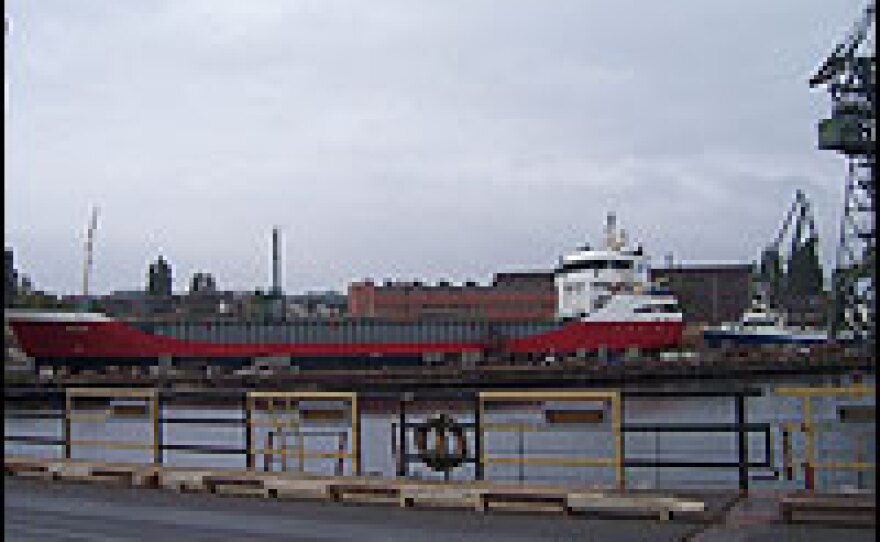

Poland is selling one of its most potent symbols of freedom — the Gdansk shipyard on the country's northern coast.
A Ukrainian company has agreed to purchase 83 percent of the shipyard, with the option of buying the rest in the next few years. The place that helped launch Poland's transition to democracy and capitalism had been facing possible bankruptcy.
The shipyard has a history: When 17,000 shipbuilders in Gdansk faced off with the communist government 27 years ago, they didn't know that they had changed the world. After weeks of strikes, they won workers rights unheard of in the Soviet bloc — and a lasting moral authority. Nine years later, Solidarity, the national union born at Gdansk, negotiated Poland's peaceful end to communism.
The Weathered Yard
At first glance, the shipyard looks half-abandoned. Some workers have gone abroad, where pay is three times higher. But about 3,000 workers here still cut, shape and assemble massive metal plates into enormous seagoing vessels.
For months now, Gdansk has faced pressure from the European Union to close two of its three boat-building slips.
The government, and management, say this would likely lead to bankruptcy and possible closure. Worker Antoni Karwowski says that would be a sorry end to a historic place.
"The shipyard would die as a symbol, and that would be unfair," Karwowski says.
The European Union says Polish government subsidies to Gdansk hurt other European shipbuilders — and have not helped restructure the yards, as EU law requires.
Poland's State Secretary for Economy Pawel Poncyljusz says Poland accepted structural cuts at the country's two other shipyards, but balked at Gdansk.
"For Gdansk, [closing] two of three slipways at once, in one year, this is ... unacceptable for us," Poncyljusz says.
Privatization Fast Track
So Poland put the Gdansk shipyard on a fast track to privatization.
There was only one serious buyer, Donbass, a huge industrial conglomerate based in Ukraine, which recently bought a major Polish steel plant. Donbass' plans thrill Gdansk's Deputy Chairman Andrzej Buczkowski.
"They gave us such a wide offer, in fact, to cover everything. So, this is like Santa Claus coming. Really," Buczkowski says. "They are solving all the matters for the shipyard, for the government, and against the commission also."
Donbass intends to diversify Gdansk, using shipbuilders to produce metal elements for bridges or windmills. And Donbass says it will cut no jobs.
Donbass' local subsidiary head, Kostyanty Lytvynov, says this isn't about saving a symbol.
"I wouldn't necessarily use the word savior, because we are doing it from the business point of view. It's a good biz," Lytvynov says. "Would you call a person who buys bread the savior of the bakery?"
The sale could end the pressure from Brussels to close two-thirds of the yard. Donbass says it would rather pay back the state subsidies than accept Brussels' demands.
There's a lot of negotiating room. The Polish government says that support was only about $13 million. European Union officials say it may be at least three times that.
Selling a Symbol?
Many shipyard workers say they're delighted that a buyer is willing to invest in Poland's most famous shipyard — and it doesn't matter that it's a Ukrainian company.
But Lech Walesa, the legendary figure who led the historic strikes at Gdansk, is sorry to see a majority stake up for sale. He led the strike in the '80s and later became Poland's president.
"I don't like it," Walesa says. "You don't sell your mother."
Roman Galezewski, the current president of the Solidarity union that Walsea founded, puts it differently. He says the rich history of Gdansk merely demands that restructuring and privatization is done right.
Copyright 2022 NPR. To see more, visit https://www.npr.org. 9(MDAzMjM2NDYzMDEyMzc1Njk5NjAxNzY3OQ001))







